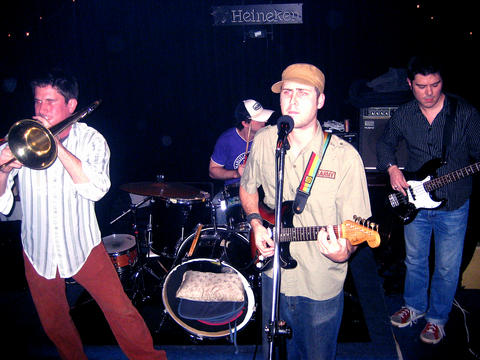The weekend was notable both for live bands and clubbing, with entertainment that covered a wide spectrum of sounds, visions and spectacle.
Starting early on Thursday night, a new band called High Tide completely rocked the crowd at Bliss, which was to be expected, given its lineup: Jesse Morden from Johnny Fatstacks on guitar, Moshe Foster from Public Radio on guitar and vocals, Greg Russell from Consider the Meek on drums, and Andy Francis from The Money Shot Horns on trombone.
Bass player Michael Tennant provided a slippery, whacked-out backbone for the group's primarily reggae sound.

PHOTO: ALITA RICKARDS
Foster's sweet voice and lyrics charmed the audience. Francis took trombone playing to a new level with rock star moves - he jumped in the air and executed a flying kick while playing, which sent some of the ladies in the crowd into a frenzy.
The group was followed by Johnny Fatstacks, which started out a bit on the slow side with cover songs. Once the group moved onto its original music, the outfit's real style shone through. Johnny Fatstacks is a rock group that crosses the line into rockabilly and alternative country, which sets it apart from the more generic sounds of local run-of-the-mill bands and makes dancing mandatory.
The Money Shot Horns played Bliss on Friday and pleased the crowd with crooning blues lyrics and funky, sexy music.
On Saturday night, superstar DJ SL played a kicking set at Barcode. It was a definite departure from the norm, and introduced a new sound to Taipei: dance-house-electro-rock.
The night continued at underground club AgeHa, with DJs F Dragon, Kid Killy, Funkstar, and others playing new-wave rave mixed with down-tempo drum and bass enthused with electro thrash. There was a massive turn out of Taipei kids, who got into the Neon Ball theme with gusto: bizarre hair cuts and fluorescent colors, Day-Glo clothing, and anime-style outfits. One boy had a fluorescent green stocking on his head. A sexy transvestite rounded out the crowd dressed as a kinky flight attendant. Props go to her for showing this reporter where the emergency exit was.
"I was a model. I had to carry a boom box," said Taipei resident Jenna Pearce. "A bunch of those Ximenting kids went. They were pretty rad. They hang out at that Vicious Circle club. The electro thrash was top notch; I was really excited to hear Yell. It was good to dance to. There was something in the air. The neon theme was mostly about the clothes, which were really different with super busy prints, and that's really fresh right now and the trend for this summer. The night was meant to be a promo for Pet Shops Girl, a shop in Ximending."
To check out the freshest clubbing style in town, visit www.wretch.cc/blog/petshopsgirl.

On April 26, The Lancet published a letter from two doctors at Taichung-based China Medical University Hospital (CMUH) warning that “Taiwan’s Health Care System is on the Brink of Collapse.” The authors said that “Years of policy inaction and mismanagement of resources have led to the National Health Insurance system operating under unsustainable conditions.” The pushback was immediate. Errors in the paper were quickly identified and publicized, to discredit the authors (the hospital apologized). CNA reported that CMUH said the letter described Taiwan in 2021 as having 62 nurses per 10,000 people, when the correct number was 78 nurses per 10,000

As we live longer, our risk of cognitive impairment is increasing. How can we delay the onset of symptoms? Do we have to give up every indulgence or can small changes make a difference? We asked neurologists for tips on how to keep our brains healthy for life. TAKE CARE OF YOUR HEALTH “All of the sensible things that apply to bodily health apply to brain health,” says Suzanne O’Sullivan, a consultant in neurology at the National Hospital for Neurology and Neurosurgery in London, and the author of The Age of Diagnosis. “When you’re 20, you can get away with absolute

May 5 to May 11 What started out as friction between Taiwanese students at Taichung First High School and a Japanese head cook escalated dramatically over the first two weeks of May 1927. It began on April 30 when the cook’s wife knew that lotus starch used in that night’s dinner had rat feces in it, but failed to inform staff until the meal was already prepared. The students believed that her silence was intentional, and filed a complaint. The school’s Japanese administrators sided with the cook’s family, dismissing the students as troublemakers and clamping down on their freedoms — with

As Donald Trump’s executive order in March led to the shuttering of Voice of America (VOA) — the global broadcaster whose roots date back to the fight against Nazi propaganda — he quickly attracted support from figures not used to aligning themselves with any US administration. Trump had ordered the US Agency for Global Media, the federal agency that funds VOA and other groups promoting independent journalism overseas, to be “eliminated to the maximum extent consistent with applicable law.” The decision suddenly halted programming in 49 languages to more than 425 million people. In Moscow, Margarita Simonyan, the hardline editor-in-chief of the